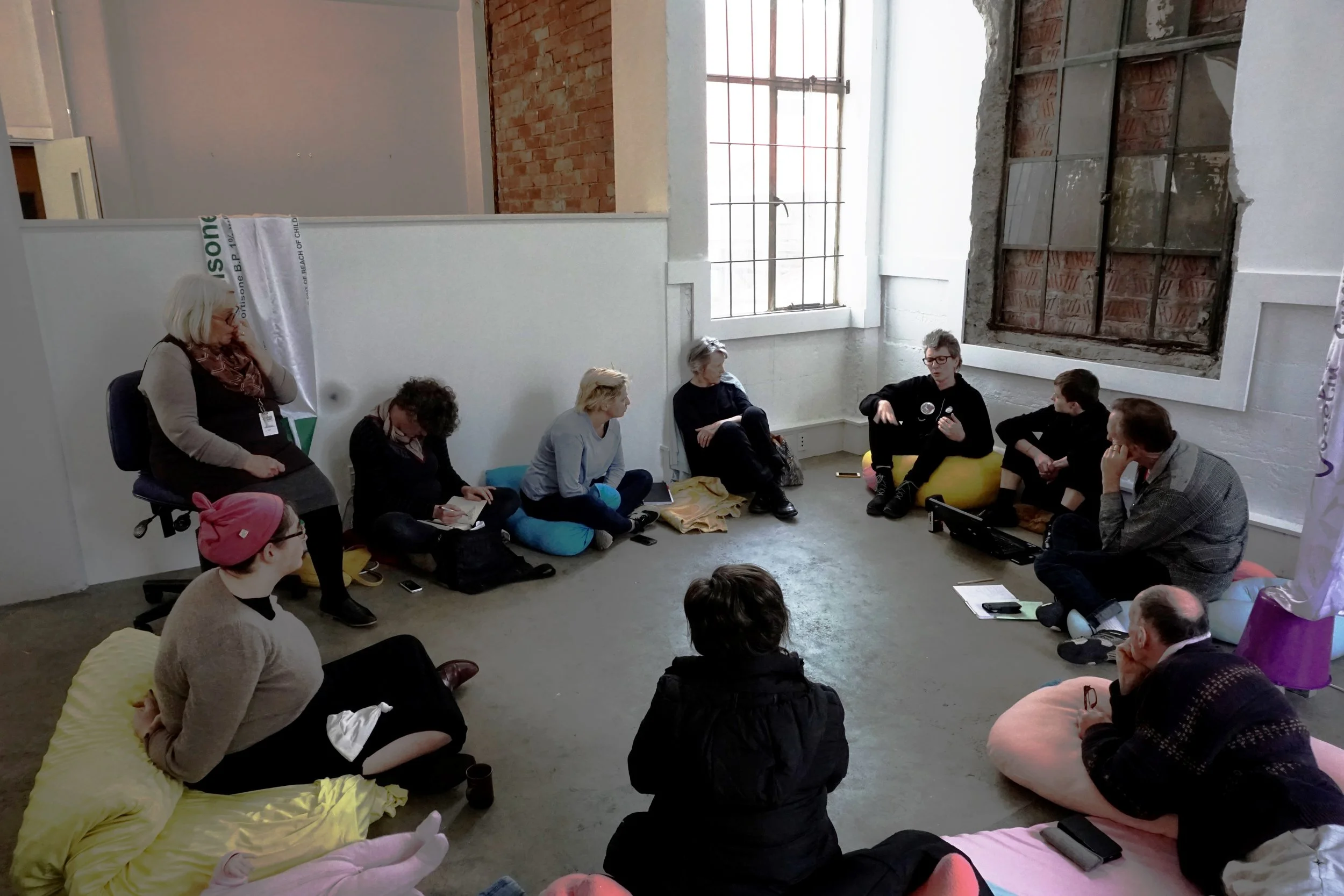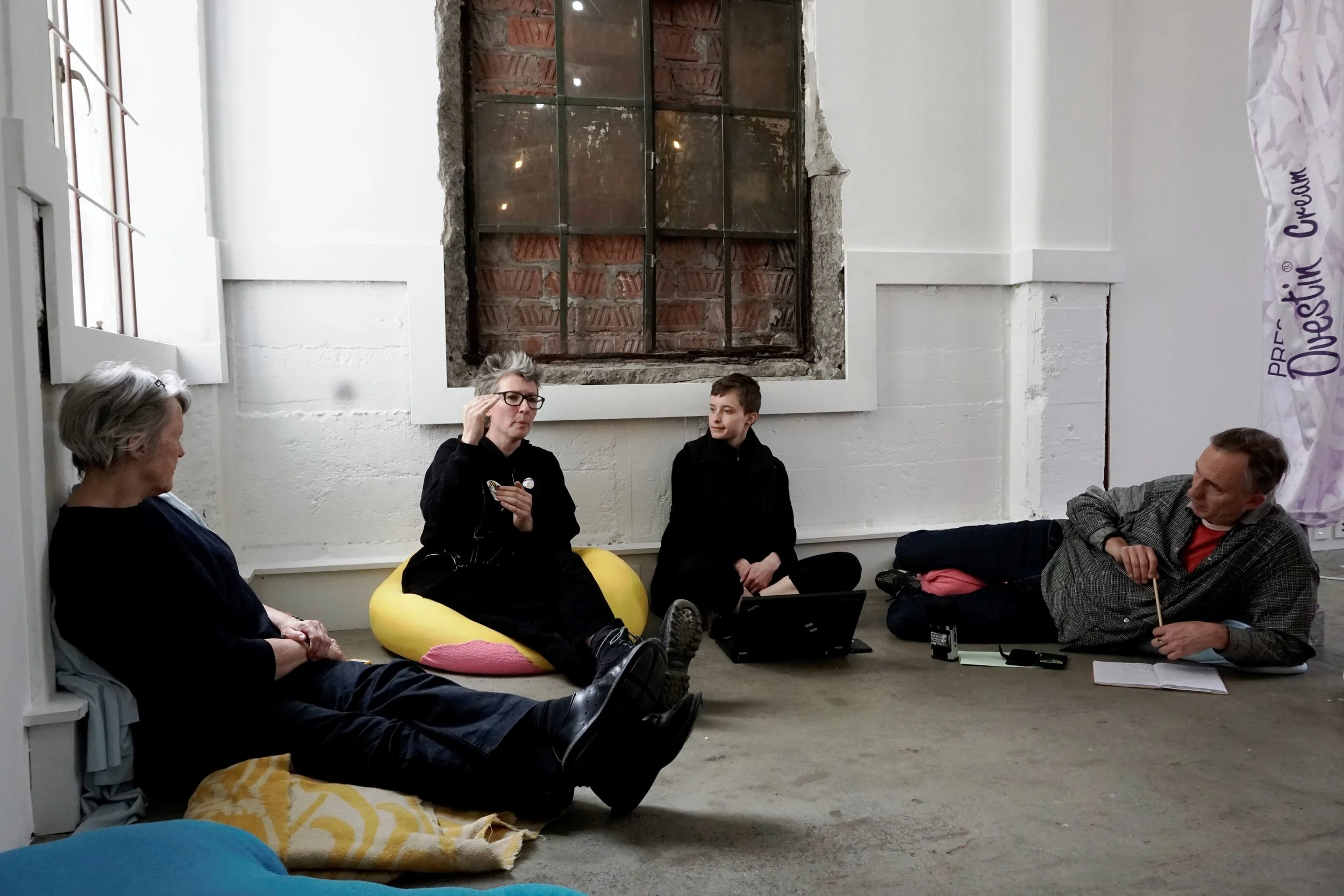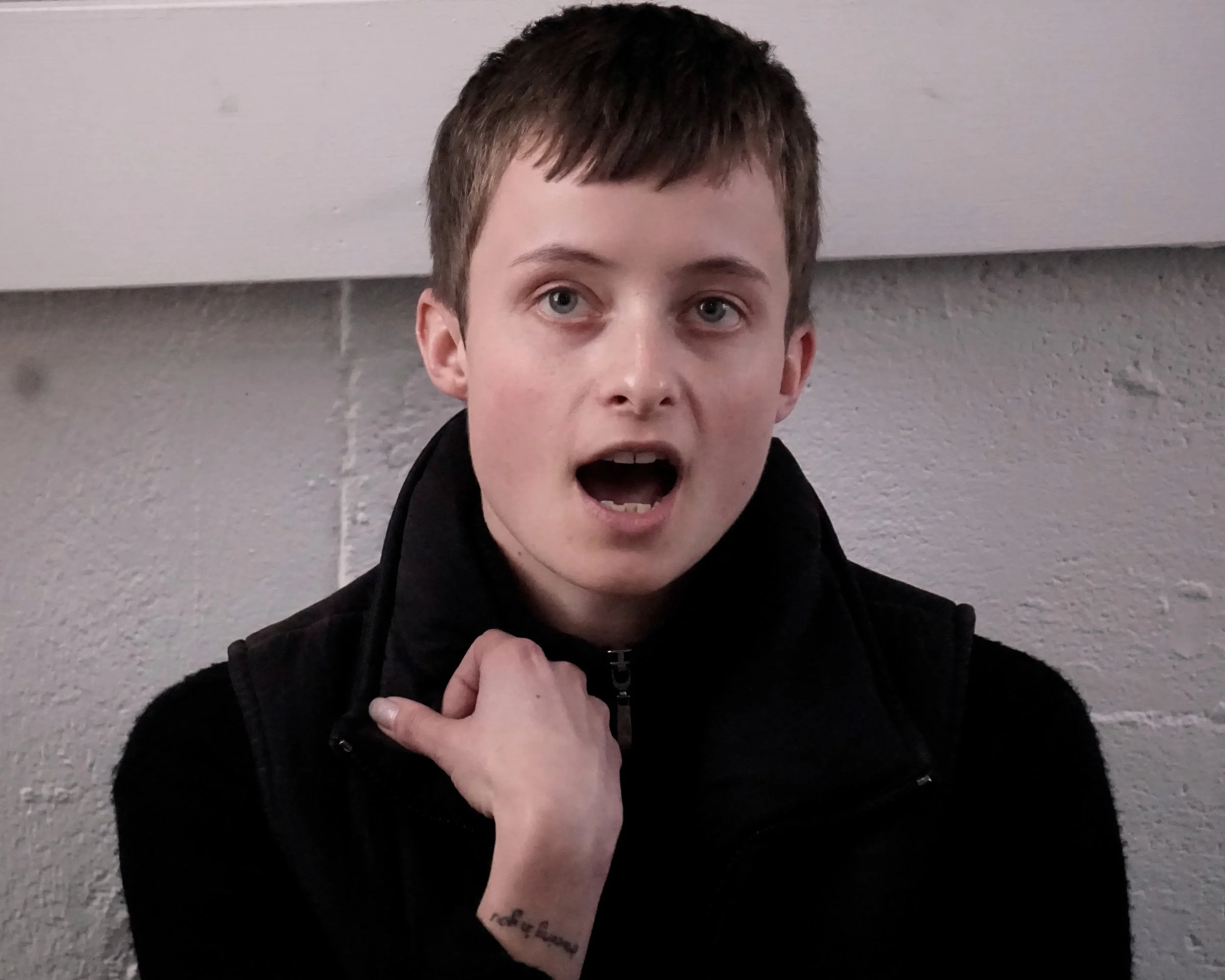“…we gave ourselves a name and that amplified our purpose” Jordana Bragg
“…find ways to take those financial stresses off of yourself because they tax your mental bandwidth” Jo Randerson
In this edition of our 2017 monthly Urban Dreams series, empowering artists to work as part of their city, we share a conversation between Wellington theatremaker and Vogemorn Bowling Club artist space cofounder Jo Randerson and artist and artist space meanwhile co-founder Jordana Bragg. Held at meanwhile gallery Level 2, 99 Willis Street, they discuss the issues around creating enduring artist space and treating art as a business. Technical issues have see us move from podcast to text format for this month.
Jo: Can I start by just saying that it’s so cool that you’ve set up Meanwhile. I love sitting on these cushion works [by George Banach-Salas]. That’s one thing I love about artist-led spaces: that things are done differently.
Jordana: Thanks! To start, I see from your website that you have a crest and in that crest it says “use what you have”. Can you elaborate: what in Barbarian Productions have you learnt to use? Is it about using anything you can get your hands on to function?
Jo: Yeah, use what is there rather than complaining about what isn’t there - or some mythical or imaginary thing that might be there in three years. What are the things that are literally all around you? Including people - their energies and interests - and the spaces around you. Like, before, you showed me the bank vault here at meanwhile. Exciting, so many ideas there. Artists are good at using spaces and finding value in things that might not be seen as having value or as beautiful by others.
Barbarian, we are a theatre based company, we use arts and creative techniques to have conversations that can be difficult. We recently worked with Jason Muir on Political Cuts where the political conversations aren’t oppositional; aren’t so singular - they can be multiple and work in lots of different ways. That we can bring more people into the conversation than just a group of white men talking about politics. That’s an example of work we like to do.
We’ve taken over an old bowling club in Vogelmorn and I guess that’s “use what you have” because it was an empty space there we’d walk past. We knew that there weren’t that many spaces for performing artists - that people were working out of their garages and living rooms. I have lots of friends who have the keys to their parents’ workplace. It gives me joy to know that **** offices after 6pm provide this kind of space!
The bowling club is a creative and community space, and I’m interested in this word ‘enduring’ because I’m hoping that this space might be more enduring than other places we’ve set up. But you only learn from setting things up.
Jordana: Was Barbarian set up in 2001?
Jo: Yes
Jordana: Because I wanted to ask about that - as someone who has set up space for creative use. Since 2001 what sorts of development has there been for Barbarian in having or finding physical space? What is the difference between 2001 and now?
Jo: I formed the company really to give myself a sense of security, because then it was only me. I was taking my solo shows around and just being Jo didn’t feel like it had much authority. When I called myself a company suddenly I was a thing, a legitimate body. But then earlier than that we were part of a space called WACT – we formed a charitable trust in the late 90s. Wellington Artists Charitable Trust. There was a space opposite Te Papa where a dance school used to be. It was a huge open floor space and about nine artists took it over: Rachel Davies, Loren Taylor, Taika Waititi, myself, Adam Gardiner, a bunch of us. We were really terrified to take it over because of the responsibility of it. We signed a lease and all had to provide $50 a week rent, which was really so much then with no income. But we set it up and ran this beautiful space and there was a studio next door where cool musicians played. And then yeah those buildings got knocked down but it was an interesting experiment. We were scared but we did it and were very proud. Then a lot of that energy went into the beginning of Toi Poneke, the arts centre, which was not a space that worked for us.
But going back to your question, the company went from being me to being about other people, working with others and now we are about growing other people as well - helping artists grow sustainable careers, which I am passionate about. I feel tired of having poor conversations with my colleagues. I feel tired of us bemoaning that. I think there are many things we can do to improve that situation and advocate for more support. Does that answer the trajectory question? It’s been long and slow in a way. Where do you feel with your trajectory?!
Jordana: Oo! I think we’ve had an interesting history so far. We started last July and were originally based at 35 Victoria Street (next to the police station), which was also an interesting location. But the idea of enduring was not something we were ever thinking of - hence naming ourselves Meanwhile. We were very aware that the physical space we held was indeterminate, we were not sure how long it would last. We were making it up as we went along but, as you say, we gave ourselves a name and that amplified our purpose and didn’t make it about our singular personhood as much.
In February 2017 we were told our original space was being sold on and we had to quickly think about whether we could or wanted to find a new space. But we had already done something that was beneficial for Meanwhile, but not so beneficial for us as co-founders, which was an open call-for proposals - right before we found out we had to leave. So we felt dedication to those who had visited the space in 2016, our studio artist’s and those who’d applied. Seeing that interest, that was scary for a time and I guess we have hit a few speed bumps along the way.
Jo: I like the idea of an entity where all the energy is going towards that and the proposals -but then there’s the practical thing that personally we don’t always have the space to cope with it.
Jordana: The point of naming the gallery was that it becomes bigger than ourselves and it did snowball rather quickly, which was fantastic, people were very keen to get involved. We operate as a gallery and studio space, that’s very important to us as a model. The maximum amount of studio artists we’ve had has been 15 people at one time, helping to cover the costs.
Jo: So the artists who use the studio…
Jordana: …pay a portion of the rent and expenses, yes.
Jo: That’s a really cool model, but its unusual because I find that funders are keen to support lots of venues or nice spaces that people can come into that look good, that flashy side of art, which is cool but there are other spaces that are actually about making work and they’re not so keen to support those spaces.
What’s happened in the performing arts is that there are a lot of different venues that have been built and set up but they don’t really fit our needs as a performing artist. Toi Poneke is a really great building and its good for ongoing organisations like DANZ, Shakespeare Globe, Arts Access, but definitely for us as performing artists the rooms aren’t big enough and also the bookings preclude full time usage because they are used for other weekly events.
So, when we set up at the Bowling Club I was very clear that for performing arts bookings we needed to keep the rent accessible, which we have done, even though we could be charging more for the space. And two, that we don’t allow anything else in during the 9 to 5 hours - well, we do occasionally if we don’t have any rehearsals in there, but we don’t allow regular events to book in there. We do have a hall next door which can in fact be booked in for events by the hour.
I find often, that in designing new building, eg. new events space they try to be everything for all people and they end up not meeting the needs of artists - however much consultation there seems to be. So we have a lot of large event venues in Wellington but artists can’t afford to use them.
Jordana: One thing that I’m grappling with as well - which you mention in the Spinoff interview as well I read - is that to create an enduring space you need people who are willing to drive it. There’s an element of self-sacrifice to it, which sounds kind of gross! I mean, it’s a lot to do this sometimes.
I was wondering your views on starting to see it as a business, because that’s something that we’re sort of looking at here. Taking it away from the personal, branding and making it ‘professional’. I resisted the idea of business for a long time with the original meanwhile because I found it difficult to balance friendship and professionality, as a co-founder.
What do you think about turning it into a business? I was reluctant but then I recognised that if I kept up that reluctance there wouldn’t be anything to be reluctant about, because there would be no structure and it would fall apart.
Jo: Yeah that’s right. There are words we have different emotional reactions to them - ‘business’ is one of those.
Jordana: They just don’t teach you that at art school either. Nobody ever said ‘this is a business’, but of course when you put art into the world pretty much everything is, including spaces like this.
Jo: I don’t know if it should be taught at school or not. I definitely agree that its missing and that when we come out of institutions I see in the performing arts that people can be enthusiastic about being a star but they don’t know how to run themselves as a business. Personally I’m not scared of that word – I’m not saying you are – but I’m fine with it, whether it means infrastructure or organisation. It’s like that word economics, ‘how do you run this?’
Artists are also very practical people so, how do we provide what we need to survive? Whether that’s food, or somewhere to stay; how can we set up our place so we can do what we want to do and don’t have those stresses? I just think: find ways to take those financial stresses off of yourself because they tax your mental bandwidth – they are tiring. There’s a great book called Scarcity that talks about how your capacity is limited when you’re under stress. When you’re under financial stress it really limits your capacity to be the full creative person you want to be.
I see it as a real lack and I’m advocating to council at the moment that they do something to support the arts and how we develop ourselves as businesses – maybe we need another word. Artists are poor, and why are they always poor? In this ‘creative city’ why aren’t we putting some infrastructure in the same way we support I.T.? It’s like you have an awesome space like Creative HQ, “that sounds like my place! I’m a creative artist!” but it’s not my place it’s for I.T., and that’s cool but why not support also how the arts grow and develop?
I want something that helps us grow our businesses the way, our way, we need to set them up. I sometimes go to these business courses and personally I sometimes feel that I’m different, that I don’t quite fit into the model. The course leaders keep saying “well, I don’t know how it works in the arts”. That’s what I think we should really get some support around and advocate for – and help each other - around.
Images: Michael McDonald



